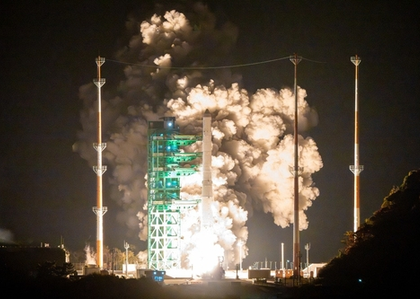S. Korea confirms successful 4th Nuri rocket launch; main satellite establishes contact
By IANS | Updated: November 27, 2025 10:25 IST2025-11-27T10:21:27+5:302025-11-27T10:25:19+5:30
Seoul, Nov 27 South Korea on Thursday confirmed the successful launch of its homegrown space rocket Nuri, which ...

S. Korea confirms successful 4th Nuri rocket launch; main satellite establishes contact
Seoul, Nov 27 South Korea on Thursday confirmed the successful launch of its homegrown space rocket Nuri, which took off from Naro Space Centre, with the main unit of the 13 satellites deployed, establishing communication with King Sejong Station in Antarctica.
The 200-tonne Nuri blasted off from the centre in the country's southern coastal village of Goheung, 473 kilometres south of Seoul, at 1:13 a.m., slightly behind the original plan of 0:55 a.m. due to a sensor issue, Yonhap news agency reported.
According to the Korea Aerospace Administration (KASA) and the Korea Aerospace Research Institute (KARI), the main satellite, CAS500-3, made contact with South Korea's research centre in Antarctica at 1:55 a.m., allowing experts to check the unit's condition.
"The fourth launch of Nuri was successful," Science Minister Bae Kyung-hoon said during a press briefing at the centre, noting all satellites have been put into orbit.
"This was an important turning point in which the focus of the space ecosystem shifted to the private sector from the previous government-oriented approach," Kyung-hoon added, noting the government will make efforts to become one of the world's top five space powerhouses in an unwavering manner.
About two minutes after liftoff, Nuri separated the first stage, followed by the second stage four minutes and 30 seconds into the flight.
After reaching the target altitude of 600 km, Nuri separated the main satellite, along with 12 cube satellites.
The main satellite will be tasked with conducting space science research, including the measurement of space magnetic fields and plasma, along with observation of auroras.
Nuri's flight ended at 1:31 a.m., completing its 18-minute mission. It will later reenter Earth's atmosphere and disintegrate as it falls.
South Korea first launched the Nuri rocket in October 2021, which failed to enter orbit while carrying a 1.5-tonne dummy satellite. In June 2022, the rocket successfully put a Performance Verification Satellite (PVSAT) and a 1.3-tonne dummy satellite into orbit.
The third launch was held in May 2023 with South Korea putting a next-generation small satellite and seven cube satellites into orbit.
The latest launch marked the first time for Hanwha Aerospace Co. to oversee the entire assembly process as part of the government's long-term plan to hand over space technologies to the private sector.
Yoon Young-bin, administrator of the KASA, stressed the government's plan to continue efforts to bolster South Korea's space exploration capabilities.
Meanwhile, the country plans to carry out the fifth launch in 2026, followed by another in 2027.
Young-bin said KASA will seek to secure additional funding beyond the sixth launch.
Disclaimer: This post has been auto-published from an agency feed without any modifications to the text and has not been reviewed by an editor
Open in app